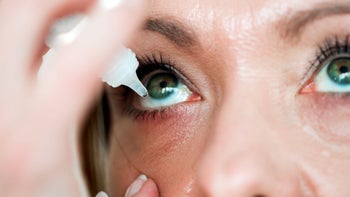
The 6 Best Vitamins for Eye Health
Key takeaways:
Many vitamins can support eye health or prevent conditions, such as diabetes, that can lead to vision problems.
Vitamins A, C, and E, along with other nutrients like beta carotene, zinc, lutein, zeaxanthin, and omega-3 fatty acids, can support healthy vision.
The best way to get these vitamins is by eating a well-balanced diet. Most people don’t need to take vitamin supplements for their eye health.

Vitamins and minerals keep your body running smoothly. And your vision is no exception. Several vitamins are key to healthy eyes, including beta carotene and vitamin A.
But there are several other micronutrients (nutrients that you need in smaller amounts) that also play a part in protecting your eyes. Not getting enough of these vitamins can lead to vision changes, especially if you have certain medical conditions.
Let’s take a look at the most important vitamins for healthy vision and which foods and drinks can help you get them into your diet.
Search and compare options
What are the most important vitamins for eye health?
A diet rich in certain vitamins and minerals can help lower your risk for developing eye conditions that affect your vision. And a well-balanced diet can also help prevent eye problems from worsening.
There’s no single vitamin that can boost eye health on its own. According to experts, many vitamins work together to help protect your eyes. Here are six vitamins that can keep your eyes healthy and your vision strong.
1. Vitamin A
This vitamin helps the retina make certain pigments that allow us to see. Vitamin A also helps keep the cornea (the clear front part of your eye) hydrated and protected.
People who don’t get enough vitamin A can develop a condition that makes it hard to see in low light. This is also called night blindness.
Luckily, most people get enough vitamin A from food. But people with medical conditions that affect their ability to absorb nutrients from food can be at risk for not getting enough vitamin A. Talk with your healthcare team to make sure you’re getting enough vitamin A if you have a medical condition like:
2. Beta carotene
Beta carotene is a carotenoid. These are compounds that give carrots (and other fruits and vegetables) their orange color. The body converts beta carotene into vitamin A, which is essential for vision and eye health.
Getting enough beta carotene can help ensure that your body always has a strong supply of vitamin A. This is especially important for people with macular degeneration. In a clinical trial, those with macular degeneration who took beta carotene as part of a daily vitamin had a lower risk of developing severe age-related macular degeneration (AMD).
That said, high amounts of beta carotene have been shown to raise the risk of lung cancer in people who smoke. If you currently smoke, it’s best to talk with a healthcare professional before taking a supplement with beta carotene. They can help you determine whether it’s safe for you to take supplements like these.
Vitamins can help your vision if you have macular degeneration. Here’s how AREDS-2 vitamins can slow down macular degeneration.
Omega-3 fatty acids can support your overall health. Take a look at the best sources of omega-3 fatty acids for improving your health and vision.
Vitamin A is good for eye health, but can you take too much? Here’s what you should know about vitamin A overdose.
3. Lutein and zeaxanthin
These compounds are also a part of the carotenoid family and can be used by your body to make vitamin A.
A clinical trial showed that people with macular degeneration who took lutein and zeaxanthin as part of a daily vitamin also had a lower risk of developing severe macular degeneration. Newer studies also suggest lutein and zeaxanthin may protect against severe macular degeneration better than beta carotene. Plus, they’re safe for people who are at higher risk for developing lung cancer.
4. Vitamin C
Vitamin C can reduce oxidative stress in your eyes. Oxygen is broken down into free radicals at a higher rate in your eyes, making them susceptible to damage. Getting enough vitamin C can protect your eyes from this damage and keep your vision healthy.
Read more like this
Explore these related articles, suggested for readers like you.
Vitamin C is essential for the formation of collagen, a protein found in your eyes and throughout your body. Getting enough vitamin C can ensure that your body can repair and rebuild collagen.
5. Zinc
Zinc helps protect the retina from oxidative stress. It also helps eliminate free radicals from your eye. If you have macular degeneration, zinc can also help lower your risk of developing severe macular degeneration when taken as a part of a daily vitamin that contains carotenoids.
6. Omega-3 fatty acids
Omega-3 fatty acids can help protect your retina from:
Inflammation
Oxidative stress
Aging
Environmental factors like light
Like its benefits on heart health, it’s thought that omega-3 fatty acids may help protect blood vessels in your eye from hardening and clogging.
What other nutrients are important for eye health?
Keep in mind, the above isn’t a complete list of vitamins that help promote eye health. Other minerals and antioxidants that may promote eye health include:
Selenium: Selenium is thought to lower oxidative stress in your macula. But there isn’t much evidence to show that selenium can lower the risk of eye disease.
Anthocyanins: A small study found that anthocyanins — antioxidants that give red, blue, and purple fruits their color — may potentially slow vision problems and lower eye pressure in people with glaucoma. Still, more studies are needed to show a strong benefit.
Which foods have vitamins that can support eye health?
Most people don’t need to take extra vitamins for their eye health. You can get all the vitamins you need to keep your vision healthy from your diet. Here are some foods and drinks rich in vitamins that can support healthy eyes and vision:
| Vitamins for eye health | Food and drink options |
|---|---|
| Vitamin A |
|
| Vitamin C |
|
| Vitamin E |
|
| Beta carotene |
|
| Lutein and zeaxanthin |
|
| Zinc |
|
| Omega-3 fatty acids |
|
| Selenium |
|
| Anthocynanins |
|
Do you need to take eye nutrition supplements?
Most people don’t need to take any supplements to keep their eyes and vision healthy. It’s generally better to get these vitamins from food. When you choose foods over supplements, you also benefit from other nutrients in the food, such as fiber and protein.
There’s one exception: If you have macular degeneration, you may benefit from taking a daily vitamin called AREDS2. A daily AREDS-2 vitamin can help slow the progression of intermediate macular degeneration and protect against vision loss from advanced macular degeneration.
AREDS-2 vitamins haven’t been shown to slow down early-stage macular degeneration. And they don’t lower your risk of developing it. But if you have intermediate or late-stage macular degeneration, these daily vitamins can help keep your vision healthy.
Frequently asked questions
AREDS-2 vitamins have been shown to lower the risk of vision loss from advanced macular degeneration by 19%. They’ve also been shown to slow down the progression of intermediate macular degeneration to the advanced form by 25%.
Vitamin A deficiency can lead to eye conditions that cause difficulty seeing in low light. Some people may experience this as blurry vision. Vitamin D deficiency has also been linked to dry eye, which can also cause blurry vision.
There are no large clinical studies looking at whether vitamins can help lessen eye floaters. In one small study, people who took a combination of lysine, vitamin C, zinc, and other supplements reported improvements in floaters. But there’s no evidence that these vitamins work for everyone.
The bottom line
Nutrients such as omega-3 fatty acids, carotenoids, and vitamin A, among others, are directly or indirectly linked to eye health. The best way to get the vitamins you need to support healthy eyes is to eat a variety of nutrient-rich whole foods — especially leafy greens. Talk with a healthcare professional or dietitian for tips on what and how to eat to support your health.
Keep in mind that your eye health is also affected by many other factors — such as age and genetics. That’s why it’s also important to stay regular with your visits to your eye doctor. They can check to make sure that your eyes are healthy.
Why trust our experts?


References
Abdel-Aal, E. S. M., et al. (2013). Dietary sources of lutein and zeaxanthin carotenoids and their role in eye health. Nutrients.
Ankamah, E., et al. (2021). Dietary intervention with a targeted micronutrient formulation reduces the visual discomfort associated with vitreous degeneration. Translational Vision Science and Technology.
Boyd, K. (2023). What is vitamin A deficiency? American Academy of Ophthalmology.
Chew, E. Y., et al. (2022). Long-term outcomes of adding lutein/zeaxanthin and ω-3 fatty acids to the AREDS supplements on age-related macular degeneration progression: AREDS2 report 28. JAMA Ophthalmology.
Dunaief, J. (2024). Vitamins for age-related macular degeneration: Do you have the correct formula? BrightFocus Foundation.
Gonçalves, A. C., et al. (2021). Dietary effects of anthocyanins in human health: A comprehensive review. Pharmaceuticals.
Khoo, H. E., et al. (2019). Nutrients for prevention of macular degeneration and eye-related diseases. Antioxidants.
National Eye Institute. (2020). AREDS/AREDS2 clinical trials. National Institutes of Health.
National Eye Institute. (2020). AREDS/AREDS2 frequently asked questions. National Institutes of Health.
National Institutes of Health. (2021). Vitamin C: Fact sheet for health professionals. National Institutes of Health.
National Institutes of Health. (2021). Vitamin E: Fact sheet for health professionals. National Institutes of Health.
National Institutes of Health. (2022). Vitamin A and carotenoids: Fact sheet for consumers. National Institutes of Health.
National Institutes of Health. (2022). Omega-3 fatty acids: Fact sheet for consumers. National Institutes of Health.
National Institutes of Health. (2022). Zinc: Fact sheet for health professionals. National Institutes of Health.
National Institutes of Health. (2024). Selenium: Fact sheet for health professionals. National Institutes of Health.
Rasmussen, H. M., et al. (2013). Nutrients for the aging eye. Clinical Interventions in Aging.
Rolando, M., et al. (2023). Dry eye disease: What is the role of vitamin D? International Journal of Molecular Sciences.
SanGiovanni, J. P., et al. (2005). The role of omega-3 long-chain polyunsaturated fatty acids in health and disease of the retina. Progress in Retinal and Eye Research.
Tanvetyanon, T., et al. (2008). Beta-carotene in multivitamins and the possible risk of lung cancer among smokers versus former smokers: A meta-analysis and evaluation of national brands. Cancer.
United States Department of Agriculture. (2015). USDA national nutrient database for standard reference release 28: Carotene, beta.
Yoshida, K., et al. (2013). Black currant anthocyanins normalized abnormal levels of serum concentrations of endothelin-1 in patients with glaucoma. Journal of Ocular Pharmacology and Therapeutics.





























